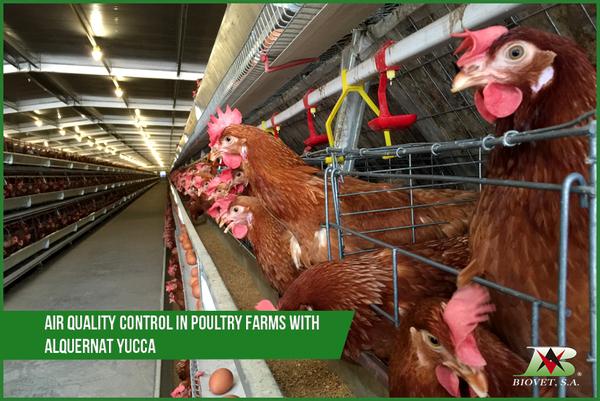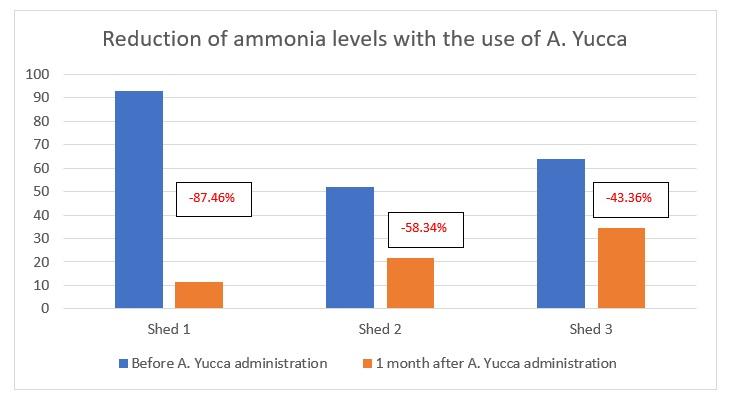
Importance of air quality control in poultry farms
Air quality control in poultry production is key to maintain animal welfare, which is closely related to productivity and absence of diseases. When the air components are not in harmless concentrations for the animals, stress appears and makes the birds prone to suffering from certain diseases. In farms, one of the main compounds that worsen air quality is ammonia, which is produced by the decomposition of organic matter. In high concentrations, ammonia causes lesions in the respiratory tract and decreases birds’ defensive capacity, increasing the prevalence of respiratory diseases, among others. Additionally, this compound generates stress that contributes to the worsening of the productive and economic parameters of the farms.
Some examples of poultry diseases associated with high ammonia levels are Newcastle disease, aerosaculitis to varying degrees, ascites due to altered respiratory capacity, and skin and eye lesions.
Therefore, a reduction of environmental ammonia in the farms to adequate levels will avoid the predisposition to suffer from several diseases and stress that negatively affect birds’ performance. For this, it is essential to reduce ammonia production in the animal itself. Biovet, S.A. has developed a natural technology that, thanks to the synergy of its active principles, is highly effective in reducing ammonia levels and improving the environmental quality of the farms.
Reduction of ammonia levels
Biovet S.A. has developed and registered a natural technology, Alquernat Yucca, which combines the synergy of different active principles that allows to reduce the concentration of ammonia in poultry farms from the intestine of the birds.
These active principles involved in reducing ammonia levels are saponins, glycocomponents and cimenol ring.
Saponins are glycosides, which modulate and select microorganisms, and reduce the concentrations of ammonia by inhibiting ammonia-producing microorganisms, by altering the permeability of their membranes. Furthermore, saponins inhibit ureases in the intestine. As they have a limited antimicrobial activity, cimenol ring boost this effect thanks to the great microbicidal effect of this phenolic compound. Therefore, both saponins and cimenol ring, act synergistically inhibiting ammonia-producing bacteria.
Glycocomponents bind ammonia, fixing and neutralizing it, reducing high concentrations and converting it into other non-toxic nitrogenous compounds, which do not interfere with the absorption of nutrients through the intestinal wall. The glycocomponent-ammonia complex can be used by beneficial microorganisms of the intestinal flora as a source of nitrogen, improving feed digestion.
Therefore, this product is effective to reduce ammonia-producing bacteria and neutralize of ammonia, both in intestine and faeces to avoid its adverse effects.
The effect in the reduction of ammonia levels in farms has been evaluated in several trials following scientific methodology. Recently, a trial was carried out in Panamá in laying hens, one of the sectors that grew the most in Panama last year.
Chart 1: Reduction of ammonia with Alquernat Yucca in a trial carried out in layers in Latin America
In chart 1 results of the ammonia reduction trial can be observed. The levels of ammonia produced by laying hens were measured in 3 different sheds of the same farm just before and one month after supplementation with Alquernat Yucca. A reduction in ammonia levels between 43.36% and 87.46% were observed. This is related to the effect of the active principles of Alquernat Yucca, which reduce ammonia-producing microorganisms, inhibit ureases, that is, enzymes involved in the formation of this compound, and fix ammonia by transforming it into non-toxic nitrogenous compounds.
Additionally, previous tests with this product in layers showed that, in addition to the reduction of ammonia levels, an indirect improvement in the productive parameters was observed: higher egg production (4.1 more dozen per layer), better feed conversion rate per dozen eggs (10.5% lower) and earlier sexual maturity (2.8 weeks earlier).
Conclusions
An adequate air quality in poultry farms is essential to ensure animal welfare and productivity. Ammonia is one of the main compounds that worsen air quality. It can damage the respiratory tract and increase the prevalence of respiratory diseases. Moreover, ammonia causes stress that negatively affects productive performance.
Biovet, S.A. has developed and registered a natural solution, Alquernat Yucca, which, thanks to the synergy of its active principles, reduces environmental ammonia concentrations by 80% or more. Thanks to the reduction of this compound, stress levels are reduced, which has a positive impact on productivity, there is an increase in egg production of more than 4 dozen eggs per layer and an improvement of more than 10% in the feed conversion rate.


















.jpg&w=3840&q=75)